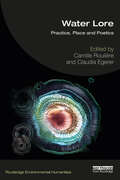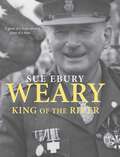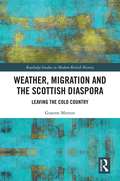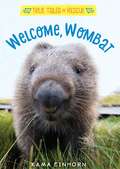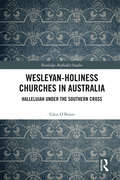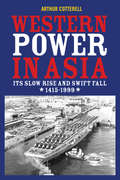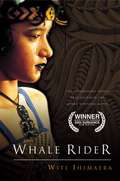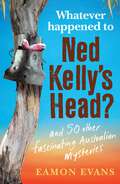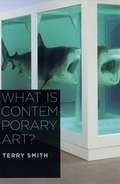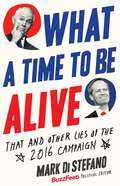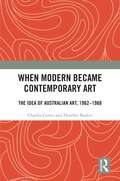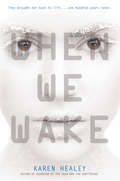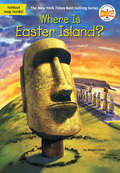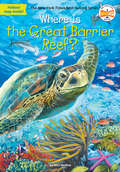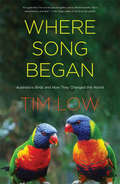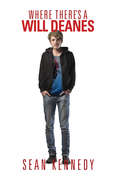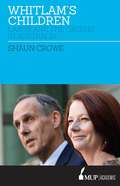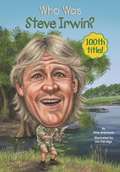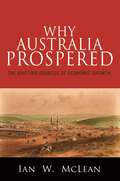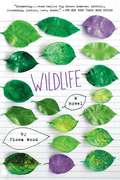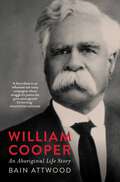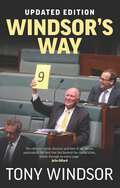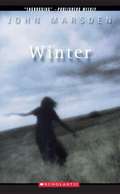- Table View
- List View
Water Lore: Practice, Place and Poetics (Routledge Environmental Humanities)
by Camille Roulière Claudia EgererLocated within the field of environmental humanities, this volume engages with one of the most pressing contemporary environmental challenges of our time: how can we shift our understanding and realign what water means to us? Water is increasingly at the centre of scientific and public debates about climate change. In these debates, rising sea levels compete against desertification; hurricanes and floods follow periods of prolonged drought. As we continue to pollute, canalise and desalinate waters, the ambiguous nature of our relationship with these entities becomes visible. From the paradisiac and pristine scenery of holiday postcards through to the devastated landscapes of post-tsunami news reports, images of waters surround us. And while we continue to damage what most sustains us, collective precarity grows. Breaking down disciplinary boundaries, with contributions from scholars in the visual arts, history, earth systems, anthropology, architecture, literature and creative writing, archaeology and music, this edited collection creates space for less-prominent perspectives, with many authors coming from female, Indigenous and LGBTQIA+ contexts. Combining established and emerging voices, and practice-led research and critical scholarship, the book explores water across its scientific, symbolic, material, imaginary, practical and aesthetic dimensions. It examines and interrogates our cultural construction and representation of water and, through original research and theory, suggests ways in which we can reframe the dialogue to create a better relationship with water sources in diverse contexts and geographies. This expansive book brings together key emerging scholarship on water persona and agency and would be an ideal supplementary text for discussions on the blue humanities, climate change, environmental anthropology and environmental history.
Weary: King of the River
by Sue EburyIn a wartime nightmare of starvation, disease, brutality and death, Sir Edward 'Weary' Dunlop's courage and compassion made him an Australian legend. During more than three years as a surgeon in the notorious work camps and vast hospital camps along the Burma-Thailand railway, he worked tirelessly to save lives and get men home to their families. He confronted his captors fearlessly; three times he was tortured and taken out to be executed, only to be reprieved at the last moment. Fellow prisoners regarded him as 'a symbol of hope and a rock'. This new, illustrated biography of Weary includes more than 150 images as well as never-before-published material about his betrayal to his captors. Weary was the quintessential Australian all-rounder-brilliant student, outstanding sportsman and irrepressible larrikin who dedicated his life to caring for people. When he died in July 1993, 10 000 people stood silently to farewell the most honoured medical man in Australia. By then, this great humanitarian's influence had spread far beyond the veteran community to embrace the entire nation.
Weather, Migration and the Scottish Diaspora: Leaving the Cold Country (Routledge Studies in Modern British History)
by Graeme MortonWhy did large numbers of Scots leave a temperate climate to live permanently in parts of the world where greater temperature extreme was the norm? The long nineteenth century was a period consistently cooler than now, and Scotland remains the coldest of the British nations. Nineteenth-century meteorologists turned to environmental determinism to explain the persistence of agricultural shortage and to identify the atmospheric conditions that exacerbated the incidence of death and disease in the towns. In these cases, the logic of emigration and the benefits of an alternative climate were compelling. Emigration agents portrayed their favoured climate in order to pull migrants in their direction. The climate reasons, pressures and incentives that resulted in the movement of people have been neither straightforward nor uniform. There are known structural features that contextualize the migration experience, chief among them being economic and demographic factors. By building on the work of historical climatologists, and the availability of long-run climate data, for the first time the emigration history of Scotland is examined through the lens of the nation’s climate. In significant per capita numbers, the Scots left the cold country behind; yet the ‘homeland’ remained an unbreakable connection for the diaspora.
Welcome, Wombat (True Tales of Rescue)
by Kama EinhornPhoto-packed series explores the stories and science behind animal sanctuaries. An up-close look at what life is like at a real wombat sanctuary in Australia—straight from a wombat herself in a nonfiction chapter book for elementary-aged readers. Includes full-color photos, graphics, and maps.When a new baby wombat shows up at Sleepy Burrows Sanctuary in Australia, Chance, the veteran wombat, is excited to show the new gal the ropes. Before any animal can be successfully released, many things have to happen. After rescue comes recovery, then rehabilitation, and finally, release. Those are animal-sanctuary tenets—an animal will remain safe until release or until it dies. For Chance and the new wombat, Panzer, this means learning how to find food, dig, and find a lifelong companion. Readers will love Chance, Panzer, and the crew of wombats. Other books in the photo-packed Sanctuary Stories series include Sweet Senior Pups.
Wesleyan-Holiness Churches in Australia: Hallelujah under the Southern Cross (Routledge Methodist Studies Series)
by Glen O'BrienMost Wesleyan-Holiness churches started in the US, developing out of the Methodist roots of the nineteenth-century Holiness Movement. The American origins of the Holiness movement have been charted in some depth, but there is currently little detail on how it developed outside of the US. This book seeks to redress this imbalance by giving a history of North American Wesleyan-Holiness churches in Australia, from their establishment in the years following the Second World War, as well as of The Salvation Army, which has nineteenth-century British origins. It traces the way some of these churches moved from marginalised sects to established denominations, while others remained small and isolated. Looking at The Church of God (Anderson), The Church of God (Cleveland), The Church of the Nazarene, The Salvation Army, and The Wesleyan Methodist Church in Australia, the book argues two main points. Firstly, it shows that rather than being American imperialism at work, these religious expressions were a creative partnership between like-minded evangelical Christians from two modern nations sharing a general cultural similarity and set of religious convictions. Secondly, it demonstrates that it was those churches that showed the most willingness to be theologically flexible, even dialling down some of their Wesleyan distinctiveness, that had the most success. This is the first book to chart the fascinating development of Holiness churches in Australia. As such, it will be of keen interest to scholars of Wesleyans and Methodists, as well as religious history and the sociology of religion more generally.
Western Power in Asia
by Arthur CotterellFor centuries, the major poweres of the West were seduced by the allure of the countries of "the Far East". Spices, textiles, silk and tea were the staples of East- West trade. But competition between Western traders eventually caused military intervention in Asian affairs and the establishment of colonial empires. These actions have shapred the history of mankind and left a legacy that still reverberates throughout Asia. Western Power in Asia is a unique contribution to the understanding of present- day Asia. Essential reading for anyone interested in world history, Arthur Cotterell offers fascinating insights into five hundred extraordinary years of power and influence by the West, which disappeared spectacularly after the Second World War. The author's ability to tell both sides of the story, with the aid of contemporary illustrations as well as quotations, makes this book a tremendous resource for students of Asian history. And because the entire colonial experience is covered for the first time within a single volume, Western Power in Asia also provides the general reader with an unusual and invaluable perspective on East- West relations. As countries such as China and India become key players on the world stage, Western Power in Asia provides a timely reminder of the path that led to their present positions, while allowing a poignant opportunity to reflect on how they might in future treat their Western trading partners.
Whale Rider
by Witi IhimaeraEight-year-old Kahu, a member of the Maori tribe of Whangara, New Zealand, fights to prove her love, her leadership, and her destiny. Her people claim descent from Kahutia Te Rangi, the legendary "whale rider." In every generation since Kahutia, a male heir has inherited the title of chief. But now there is no male heir, and the aging chief is desperate to find a successor. Kahu is his only great-grandchild--and Maori tradition has no use for a girl. But when hundreds of whales beach themselves and threaten the future of the Maori tribe, it is Kahu who saves the tribe when she reveals that she has the whale rider's ancient gift of communicating with whales.
What About Tomorrow
by Ivan SouthallIn Australia during the Depression, a fourteen-year-old boy runs away from home after a bike accident and sets in motion events that will determine his future.
What Ever Happened to Ned Kelly's Head?
by Eamon EvansWho stole the priceless Picasso from the NGV? Was Errol Flynn a Nazi spy? Did an Australian kill the infamous Red Baron?If you think Australia’s history is straightforward, you’re dead wrong. This is a land of the strange, the spooky and the unexplained. From the eerie ball of light that stalked a terrified family across the Nullabor, to the whereabouts of Victoria’s parliamentary mace, to the unidentified body found propped up on an Adelaide beach, and, yes, to the whereabouts of Ned Kelly’s skull, you’ll find our history has plenty of mysterious twists and unanswered questions.With his signature wit, Eamon Evans’ investigates Australia’s most curious mysteries, digs up the evidence and lays it out for the court of public opinion to decide. Whatever Happened to Ned Kelly’s Head will have you scratching your head and wondering long after the last page.
What Ever Happened to Ned Kelly's Head?
by Eamon EvansWho stole the priceless Picasso from the NGV? Was Errol Flynn a Nazi spy? Did an Australian kill the infamous Red Baron? If you think Australia's history is straightforward, you're dead wrong. This is a land of the strange, the spooky and the unexplained. From the eerie ball of light that stalked a terrified family across the Nullabor, to the whereabouts of Victoria's parliamentary mace, to the unidentified body found propped up on an Adelaide beach, and, yes, to the whereabouts of Ned Kelly's skull, you'll find our history has plenty of mysterious twists and unanswered questions. With his signature wit, Eamon Evans' investigates Australia's most curious mysteries, digs up the evidence and lays it out for the court of public opinion to decide. Whatever Happened to Ned Kelly's Head will have you scratching your head and wondering long after the last page.
What Is Contemporary Art?
by Terry SmithWho gets to say what counts as contemporary art? Artists, critics, curators, gallerists, auctioneers, collectors, or the public? Revealing how all these groups have shaped today's multifaceted definition, Terry Smith brilliantly shows that a historical approach offers the best answer to the question: What Is Contemporary Art?
What a Time to Be Alive: That and Other Lies of the 2016 Campaign
by Mark Di StefanoWhat a time to be alive: That and other lies in the 2016 campaign is the ugly and un-sanitised diary behind the curtain of the double dissolution election campaign. A poll fought between two wildly ambitious men who want to win their first election, whatever it takes. Mark Di Stefano finds out what is happening behind the scenes and how the two campaigns manufacture, massage and manipulate their parties, policies and principles. What a time to be alive documents the daily ride of an historic election campaign, week by long week, taking you into the bizarre world of staged photo ops, booze-drenched regrets and dirty direct messages. The exposure of the unscripted moments with political leaders, their over-worked staff and secretive minders, shows how the sausage that is this Australian election, is made and reveals what is really inside.
When Modern Became Contemporary Art: The Idea of Australian Art, 1962-1988
by Charles Green Heather BarkerThis book is a portrait of the period when modern art became contemporary art. It explores how and why writers and artists in Australia argued over the idea of a distinctively Australian modern and then postmodern art from 1962, the date of publication of a foundational book, Australian Painting 1788–1960, up to 1988, the year of the Australian Bicentennial.Across nine chapters about art, exhibitions, curators and critics, this book describes the shift from modern art to contemporary art through the successive attempts to define a place in the world for Australian art. But by 1988, Australian art looked less and less like a viable tradition inside which to interpret ‘our’ art. Instead, vast gaps appeared, since mostly male and often older White writers had limited their horizons to White Australia alone. National stories by White men, like borders, had less and less explanatory value. Underneath this, a perplexing subject remained: the absence of Aboriginal art in understanding what Australian art was during the period that established the idea of a distinctive Australian modern and then contemporary art.This book reflects on why the embrace of Aboriginal art was so late in art museums and histories of Australian art, arguing that this was because it was not part of a national story dominated by colonial, then neo-colonial dependency. It is important reading for all scholars of both global and Australian art, and for curators and artists.
When We Wake (When We Wake Ser.)
by Karen HealeyMy name is Tegan Oglietti, and on the last day of my first lifetime, I was so, so happy.Sixteen-year-old Tegan is just like every other girl living in 2027--she's happiest when playing the guitar, she's falling in love for the first time, and she's joining her friends to protest the wrongs of the world: environmental collapse, social discrimination, and political injustice.But on what should have been the best day of Tegan's life, she dies--and wakes up a hundred years in the future, locked in a government facility with no idea what happened.Tegan is the first government guinea pig to be cryonically frozen and successfully revived, which makes her an instant celebrity--even though all she wants to do is try to rebuild some semblance of a normal life. But the future isn't all she hoped it would be, and when appalling secrets come to light, Tegan must make a choice: Does she keep her head down and survive, or fight for a better future?Award-winning author Karen Healey has created a haunting, cautionary tale of an inspiring protagonist living in a not-so-distant future that could easily be our own.
Where Is Easter Island?
by Megan Stine John HinderliterUnearth the secrets of the mysterious giant stone statues on this tiny remote Pacific island.Easter Island, in the middle of the Pacific Ocean thousands of miles from anywhere, has intrigued visitors since Europeans first arrived in the 1700s. How did people first come to live there? How did they build the enormous statues and why? How were they placed around the island without carts or even wheels? Scientists have learned many of the answers, although some things still remain a mystery. Megan Stine reveals it all in a gripping narrative.This book, part of the New York Times best-selling series, is enhanced by eighty illustrations.
Where Is the Great Barrier Reef (Where Is?)
by Nico Medina John HinderliterIn this Where Is? title, kids can explore the Great Barrier Reef--big enough to be seen from space but made up of billions of tiny living organisms.The Great Barrier Reef, off the coast of Australia, is the world's largest coral reef system. Stretching more than 1,400 miles, it provides a home to a wide diversity of creatures. Designated a World Heritage Site, the reef is suffering from the effects of climate change but this fascinating book shows this spectacular part of our planet. From the Trade Paperback edition.
Where Song Began: Australia's Birds and How They Changed the World
by Tim LowTim Low, award-winning author of Feral Future, in an eye-opening book on the unique nature of Australian birds and their role in ecology and global evolution. Renowned for its unusual mammals, Australia is a land of birds that are just as unusual, just as striking, a result of the continent''s tens of millions of years of isolation. Compared with birds elsewhere, ours are more likely to be intelligent, aggressive and loud, to live in complex societies, and are long-lived. They''re also ecologically more powerful, exerting more influences on forests than other birds. But unlike the mammals, the birds did not keep to Australia; they spread around the globe. Australia provided the world with its songbirds and parrots, the most intelligent of all bird groups. It was thought in Darwin''s time that species generated in the Southern Hemisphere could not succeed in the Northern, an idea that was proven wrong in respect of birds in the 1980s but not properly accepted by the world''s scientists until 2004 - because, says Tim Low, most ornithologists live in the Northern Hemisphere. As a result, few Australians are aware of the ramifications, something which prompted the writing of this book. Tim Low has a rare gift for illuminating complex ideas in highly readable prose, and making of the whole a dynamic story. Here he brilliantly explains how our birds came to be so extraordinary, including the large role played by the foods they consume (birds, too, are what they eat), and by our climate, soil, fire, and Australia''s legacy as a part of Gondwana. The story of its birds, it turns out, is inseparable from the story of Australia itself, and one that continues to unfold, so much having changed in the last decade about what we know of our ancient past. Where Song Began also shines a light on New Guinea as a biological region of Australia, as much a part of the continent as Tasmania. This is a work that goes far beyond the birds themselves to explore the relationships between Australia''s birds and its people, and the ways in which scientific prejudice have hindered our understanding. ''Tim Low is the rare author who is able to turn complex and sophisticated research into a form digestible to the general reader without ''''dumbing down'''' the science . . . A brilliantly readable book that not only gives Australian birds recognition long overdue, but allows for a fresh understanding of the way the world (and particularly our island continent) functions. '' Sean Dooley, Sydney Morning Herald''Low has written a book that is highly informative, but also most readable. Twitchers everywhere will rejoice, but there is also much here that ordinary readers will enjoy. Where Song Began teaches us all a huge amount about our birds--not least that we should be very proud of them. Thoroughly recommended. '' Lucy Sussex, Sunday Age''Stuffed with the fruits of long experience, wide travels (is there anywhere Tim Low hasn''t been?) and deep research. '' The Saturday Paper''Esteemed Australian biologist Tim Low tells the incredible story of the origins of global bird life . . . And this story is exciting: ambitious in scope and filled with daring reconstructions of the past, Low''s provocative study turns a number of evolutionary assumptions on their heads . . . Low''s book will sensitise readers to their bird-filled environments and inject critical insights into ecological pasts and futures. '' Lucy Van, Readings Monthly''If you have an interest in natural history and the environment, read this book and you won''t look at Australia in quite the same way again . . . Crammed with intriguing facts and ideas . . . A serious feat of synthesis that few bird observers or natural historians, let alone few authors, would have the knowledge, experience, time or access to academic resources to pull together. '' Bob Beale, Sunday Age''The story . . . will be a revelation for most readers . . . crammed with intriguing facts and ideas . . . with outbreaks of first-class storytelling . . . Where Song Began is a serious fea...
Where There's a Will Deanes (Get Out #4)
by Sean KennedyGet Out: Book FourMicah Johnson is coming back to Melbourne, and the story of him and his friends is coming to an end. Or will it be a new beginning? Will Deanes and Micah Johnson have a past, one that ranges from bitter enemies to best friends. There might be an undercurrent of something else, but Micah remains oblivious, and all Will can do is try to move on. Except now Micah’s returning to Melbourne full-time, and that means they can’t avoid each other or the tensions that arise. Will is still dealing with an injury that ended his football career, while Micah’s continues to thrive. As they face highs, lows, and family tragedies, they’ll have to get to know each other all over again. Will Micah see that Will means much more to him than a friend?
Whitlam's Children: Labor and the Greens in Australia
by Shaun CroweOver the past three decades, progressive politics in Australia has undergone a gradual but unmistakable transformation. Where the Australian Labor Party once enjoyed dominance over the political left it now shares space with the Greens; at times depending on minor-party support to form government, and even more often to pass contentious legislation. Based on over forty interviews with politicians and party figures, Whitlam's Children is the first study of this increasingly important relationship in Australian politics. Did previous attempts at cooperation, particularly minority government under Julia Gillard, deliver successful government, and how do each judge the experiment in hindsight? Why are certain policy areas, like refugee settlement and environmental policy, so stubborn and divisive? And will we ever see a more lasting coalition on the Australian left, to mirror the established arrangement on the Australian right? While revealing a variety of perspectives, even within parties, the research uncovers a productive, if often hostile relationship; united by a series of shared values, but divided by different approaches to politics, elections and parliament. Featuring a preface by Geoff Gallop
Who Was Steve Irwin? (Who was?)
by Dina Anastasio Jim EldridgeBy popular demand, the 100th Who Was...? subject is Steve Irwin!Steve Irwin did not have a typical childhood. Born in Melbourne, Australia, on February 22, 1962, he was raised on the wildlife park his parents owned. He cared for the animals and especially loved reptiles--he got a python for his sixth birthday! At nine years old, Steve was already helping his father wrestle small crocodiles. He became a crocodile trapper after graduating high school, catching the creatures before dangerous poachers could. Steve met his wife, Terri, at his family's park, and instead of a honeymoon, the pair filmed a wildlife documentary that led to the creation of the well-known series The Crocodile Hunter. Tragically, Steve was killed on September 4, 2006 while filming a documentary when a stingray attacked, piercing his heart. He was forty-four years old. However, his life's work obviously still strikes a chord with kids who voted him the winner of the 100th Who Was...? title.
Why Australia Prospered: The Shifting Sources of Economic Growth (The Princeton Economic History of the Western World #43)
by Ian W. McLeanThis book is the first comprehensive account of how Australia attained the world's highest living standards within a few decades of European settlement, and how the nation has sustained an enviable level of income to the present. Why Australia Prospered is a fascinating historical examination of how Australia cultivated and sustained economic growth and success. Beginning with the Aboriginal economy at the end of the eighteenth century, Ian McLean argues that Australia's remarkable prosperity across nearly two centuries was reached and maintained by several shifting factors. These included imperial policies, favorable demographic characteristics, natural resource abundance, institutional adaptability and innovation, and growth-enhancing policy responses to major economic shocks, such as war, depression, and resource discoveries. Natural resource abundance in Australia played a prominent role in some periods and faded during others, but overall, and contrary to the conventional view of economists, it was a blessing rather than a curse. McLean shows that Australia's location was not a hindrance when the international economy was centered in the North Atlantic, and became a positive influence following Asia's modernization. Participation in the world trading system, when it flourished, brought significant benefits, and during the interwar period when it did not, Australia's protection of domestic manufacturing did not significantly stall growth. McLean also considers how the country's notorious origins as a convict settlement positively influenced early productivity levels, and how British imperial policies enhanced prosperity during the colonial period. He looks at Australia's recent resource-based prosperity in historical perspective, and reveals striking elements of continuity that have underpinned the evolution of the country's economy since the nineteenth century.
Wildlife
by Fiona WoodDuring a semester in the wilderness, sixteen-year-old Sib expects the tough outdoor education program and the horrors of dorm life, but friendship drama and an unexpected romance with popular Ben Capaldi? That will take some navigating. New girl Lou has zero interest in fitting in, or joining in. Still reeling from a loss that occurred almost a year ago, she just wants to be left alone. But as she witnesses a betrayal unfolding around Sib and her best friend Holly, Lou can't help but be drawn back into the land of the living. Fans of Melina Marchetta, Rainbow Rowell, and E. Lockhart will adore this endearing and poignant story of first love, true friendship, and going a little bit wild.
William Cooper: An Aboriginal Life Story
by Bain AttwoodWilliam Cooper's passionate struggle against the dispossession of Aboriginal people and the denial of their rights and his heroic fight for them to become citizens in their own country has been widely commemorated and celebrated. By carefully reconstructing the historical losses his Yorta Yorta people suffered and endured, William Cooper: An Aboriginal Life Story reveals how the first seventy years of Cooper's life inspired the remarkable political work he undertook in the 1930s. Focusing on Cooper's most important campaigns-his famous petition to the British king George for an Aboriginal representative in the Australian parliament, his call for a day of mourning after 150 years of colonisation, the walk-off of the Yorta Yorta people from Cumeroogunga reserve in 1939 and his opposition to the establishment of an Aboriginal regiment in the Second World War-this carefully researched study sheds important new light on the long struggle that Indigenous people have fought to have the truth about Australia's black history heard and win representation in Australia's political order.
Windsor's Way Updated Edition
by Tony WindsorTraitor or saviour? Tony Windsor has been called both in his 22-year political career, but never more often than when he supported Julia Gillard's government in 2010. And now he's back.After three years in retirement, Tony Windsor refuses to stand by and watch regional Australia relegated to being taken for granted. In the forthcoming election he will go head to head with the leader of the National Party, Barnaby Joyce in the seat of New England.Windsor's Way reveals Tony's courageous political path—as a young branch member he moved a no-confidence motion against the National Party leader. He conducted a rigorous 17-day assessment period of Tony Abbott and Julia Gillard's promises following the indecisive 2010 election and then seized the opportunities of the subsequent hung parliament.By staying true to his values and beliefs in difficult and challenging times, Tony Windsor has become an emblem of integrity and decency in Australian politics.
Winter
by John MarsdenFor 12 years Winter has been haunted. And now, at 16, she must head back to her old home, where a pair of family tragedies forever altered her life. What she discovers is powerful and shocking but must be dealt with in order for life to go on.
